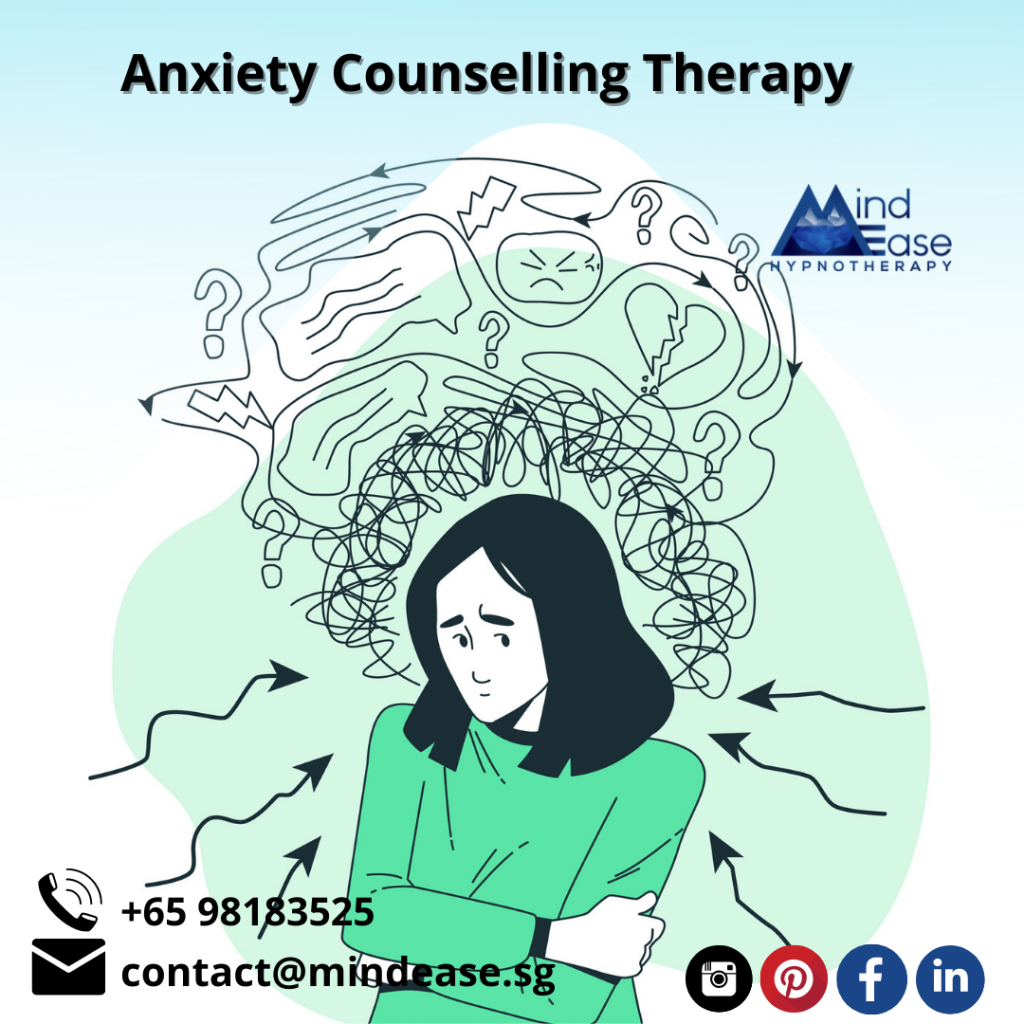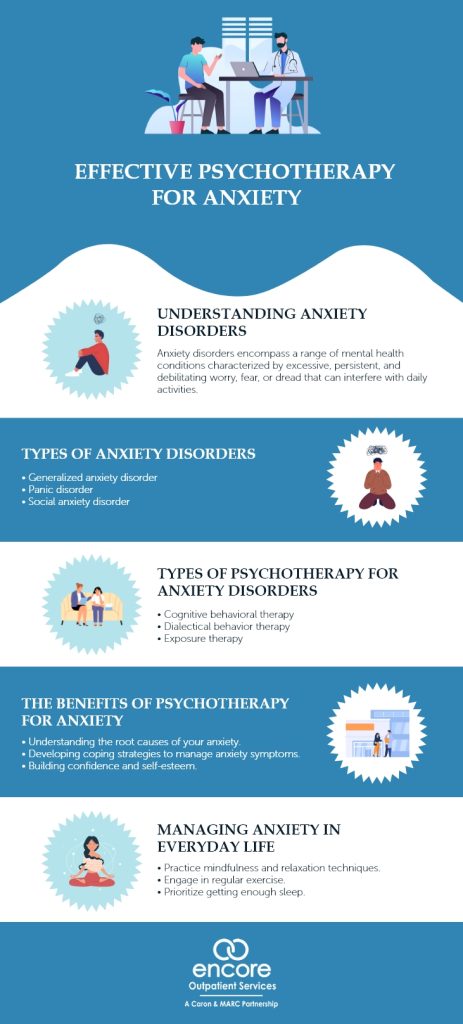Counselling for anxiety disorder available virtually and in-person near you
Counselling for anxiety disorder available virtually and in-person near you
Blog Article
Discovering Various Approaches in Counselling for Stress And Anxiety Disorder for Long Lasting Change
When dealing with stress and anxiety conditions, it's necessary to discover a selection of counseling strategies. Each method uses unique understandings and devices to aid you manage your symptoms effectively. You may find that incorporating strategies can yield the most effective outcomes. Nevertheless, comprehending the nuances of these approaches is crucial to fostering long-term adjustment. What if the appropriate mix could release a brand-new level of psychological health for you?
Recognizing Anxiety Problems: A Brief Overview
Anxiety disorders, which impact numerous individuals worldwide, can considerably affect life. You might experience frustrating feelings of anxiety or fret that appear unmanageable. These feelings can lead to physical signs and symptoms like a racing heart, sweating, and even wooziness. Usual kinds of anxiety conditions include generalized stress and anxiety condition, panic attack, and social anxiousness disorder. Each has one-of-a-kind signs, yet they all share a tendency to disrupt your routine and relationships.Understanding the origin of your anxiety is essential. It could originate from genes, mind chemistry, or life experiences. Acknowledging your triggers can assist you manage your reactions better. It's crucial to bear in mind that you're not the only one in this struggle. Many individuals encounter similar challenges, and looking for help is a solid action toward sensation better. By learning more about anxiousness conditions, you're currently on the path to understanding and managing your problem better.
Cognitive-Behavioral Therapy: Testing Negative Thought Patterns
In Cognitive-Behavioral Treatment, you'll begin by determining the adverse thought causes that add to your anxiousness. Once you recognize these ideas, you'll function on replacing them with even more positive choices. Together, you'll build effective coping techniques to aid handle your anxiety in daily circumstances.
Recognizing Unfavorable Idea Triggers

When you come across minutes of distress, identifying the specific triggers behind your adverse thoughts can be necessary in handling anxiousness. Start by taking note of situations that prompt feelings of fear or fear. Is it a congested area, a forthcoming deadline, or a conversation with specific people? Write these instances in a journal. This will certainly help you recognize patterns in your thinking. Likewise, notice physical sensations that accompany your adverse ideas, like an auto racing heart or tightness in your breast. By pinpointing these triggers, you gain understanding into what's fueling your stress and anxiety. Understanding these links is the very first step in challenging those thoughts and inevitably restoring control over your psychological reactions.
Changing Ideas With Positives
Challenging negative thought patterns is a vital action in transforming your attitude and reducing stress and anxiety. You may often locate yourself entraped in cycles of insecurity or tragic reasoning. Rather than letting these thoughts determine your feelings, technique replacing them with practical alternatives or positive affirmations. For example, when you believe, "I can't manage this," shift it to, "I can handle obstacles one action each time." This easy modification can substantially affect your psychological state. Routinely identifying and responding to these unfavorable thoughts aids produce a much healthier inner discussion. Bear in mind, it requires time and effort, yet constantly exercising this strategy can cause enduring change, empowering you to face anxiety with restored self-confidence and resilience.
Building Coping Approaches With Each Other
Replacing adverse thoughts is only the beginning of handling stress and anxiety successfully. To create lasting modification, you need to develop coping methods that equip you. Cognitive-Behavioral Therapy (CBT) aids you recognize and challenge those purposeless thought patterns. With each other, you and your counselor can explore exactly how these ideas effect your feelings and behaviors.Start by establishing practical techniques, like journaling or mindfulness exercises, that permit you to confront stress and anxiety head-on. When you encounter your worries gradually, you'll find out to respond in a different way.

Mindfulness and Acceptance-Based Approaches: Growing Present-Moment Understanding
As you browse the complexities of anxiety, incorporating mindfulness and acceptance-based techniques can substantially improve your capability to cultivate present-moment understanding. By focusing on the present moment, you'll locate that you can observe your thoughts and feelings without judgment (Counseling services for anxiety). This method aids you acknowledge your anxiety without really feeling overwhelmed by it.Engaging in mindfulness exercises, such as deep breathing, body scans, or led meditations, allows you to ground on your own in your present experience. Acceptance-based techniques motivate you to welcome your emotions as opposed to combat versus them. When you approve your feelings, they shed their power over you.Incorporating these techniques right into your everyday regimen can transform exactly how you respond to anxiety. You'll develop durability and discover to navigate demanding scenarios with better convenience. Ultimately, growing present-moment recognition lays the foundation for enduring modification, encouraging you to lead a much more fulfilling life
Direct Exposure Therapy: Confronting Worries Progressively
Direct exposure therapy helps you face your fears in a gradual way, making it less frustrating. You'll discover strategies to deal with anxiety-provoking situations detailed, while also developing coping approaches to handle your responses. This method empowers you to take control and lower anxiety with time.
Progressive Direct Exposure Techniques

When dealing with anxiety, slowly facing your fears can be an effective way to reclaim control. This strategy, called progressive direct exposure, includes gradually revealing yourself to the scenarios or objects that cause your anxiety. Start with much less intimidating situations and slowly work your way approximately more difficult ones. As an example, if you're terrified of public speaking, you may start by talking in front of a mirror, then proceed to sharing thoughts with a buddy, and ultimately address a small group. Each action assists desensitize you to the fear, building your confidence gradually. Bear in mind, it's vital to pace on your own and commemorate small victories as you move via this procedure, enhancing your capacity to take care of anxiousness effectively.
Building Coping Techniques
Structure reliable coping methods is essential for taking care of anxiousness, specifically as you face your fears progressively - Counseling services for anxiety. One effective approach is direct exposure treatment, where you begin by facing your worries in a regulated fashion. Start with much less frightening circumstances and gradually function your means as much as even more difficult scenarios. This progressive exposure assists review desensitize you to stress and anxiety triggers, making them less overwhelming.Incorporate leisure strategies, such as deep breathing or mindfulness, to calm your mind throughout direct exposure. Track your progression, celebrating small success along the way to boost your click now self-confidence. Keep in mind, it's all right to take your time; the objective isn't perfection however stable enhancement. By constructing these approaches, you'll empower on your own to browse stress and anxiety and accept life more fully
Psychodynamic Treatment: Discovering Origin Reasons of Anxiety
Psychodynamic treatment checks out the unconscious mind, exposing the root creates of your anxiety. By analyzing your thoughts, sensations, and previous experiences, this technique assists you uncover underlying disputes and unsettled concerns that may add to your existing anxiety. You'll work with a therapist to explore childhood years experiences, partnerships, and emotional patterns that shape your reactions today.As you acquire understanding right into these much deeper layers of your mind, you'll start to acknowledge exactly how past occasions influence your present actions. This understanding can result in catharsis, allowing you to refine emotions you may have suppressed.Through the therapeutic partnership, you can likewise identify defense reaction that might have developed over time, using a more clear path to alter. Ultimately, psychodynamic therapy outfits you with the tools to address your anxiety at its core, advertising lasting change in your emotional health.
Integrative and Alternative Methods: Combining Techniques for Greater Efficacy
Incorporating numerous therapeutic methods can enhance your journey toward handling anxiousness a lot more effectively. By incorporating aspects from cognitive-behavioral treatment, mindfulness practices, and holistic methods, you can develop a tailored technique that addresses your special requirements. You might use cognitive-behavioral methods to test adverse idea patterns while including mindfulness workouts to ground on your own in the present moment.Additionally, checking out all natural practices such as yoga exercise or reflection can promote relaxation and minimize stress and anxiety signs. This blend allows you to create higher self-awareness and resilience.Experimenting with these diverse methods can help you uncover what reverberates most with you. Keep in mind, it's regarding finding a synergy that functions, instead than adhering to a solitary method. This integrative technique not only offers immediate alleviation but also fosters long-term skills for managing anxiety, empowering you to recover control over your life.
The Duty of Support Systems: Structure Strength With Connection
While it might appear that taking care of stress and anxiety is a singular trip, having a solid support system can play an essential function in your strength. Surrounding on your own with understanding pals, household, or assistance groups creates a risk-free room where you can honestly share your experiences and feelings. When you get in touch with others, you remind on your own that you're not alone in this struggle.These partnerships provide support and can provide useful coping techniques that have benefited others. It's additionally a possibility to obtain perspective; friends can aid you see scenarios in a different way, reducing feelings of isolation.Moreover, emotional assistance promotes a feeling of belonging, which can greatly alleviate anxiety signs and symptoms. By leaning on your assistance system, you can construct strength and tackle difficulties better. Keep in mind, getting to out for help is an indicator of stamina, and it can make all the distinction in your journey toward managing anxiety.
Regularly Asked Questions
What Are the Typical Symptoms of Anxiety Conditions?
You could experience restlessness, tiredness, difficulty focusing, irritation, muscle mass stress, and sleep disruptions. Physical signs and symptoms can include fast heartbeat, sweating, and shivering. Recognizing these indications early can aid you look for suitable assistance and treatment.
The Length Of Time Does Treatment Commonly Last for Anxiousness Disorders?
Treatment for anxiety disorders normally lasts anywhere from a few weeks to a number of months. It actually depends on your private requirements, progression, and the strategies your specialist uses to assist you handle your anxiousness efficiently.
Can Medication Be Made Use Of Alongside Treatment for Stress and anxiety?
Yes, medicine can absolutely be utilized along with therapy for anxiety. Integrating both techniques typically boosts treatment performance, aiding you manage symptoms while checking out underlying concerns with therapy (Counseling services for anxiety). Constantly consult your doctor for tailored recommendations
Exist Self-Help Methods for Managing Anxiety?
Yes, there are several self-help strategies for taking care of anxiousness. You can exercise discover here mindfulness, participate in regular workout, maintain a balanced diet, develop a regular, and use deep breathing strategies to help decrease anxiety signs efficiently.
How Do I Know if I Required Expert Aid for Anxiousness?

Report this page